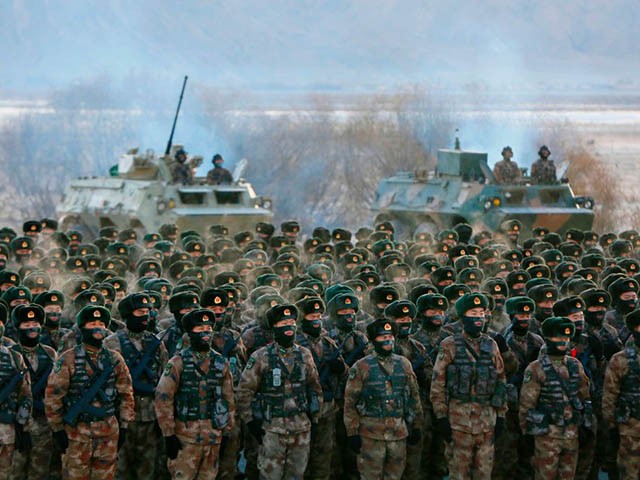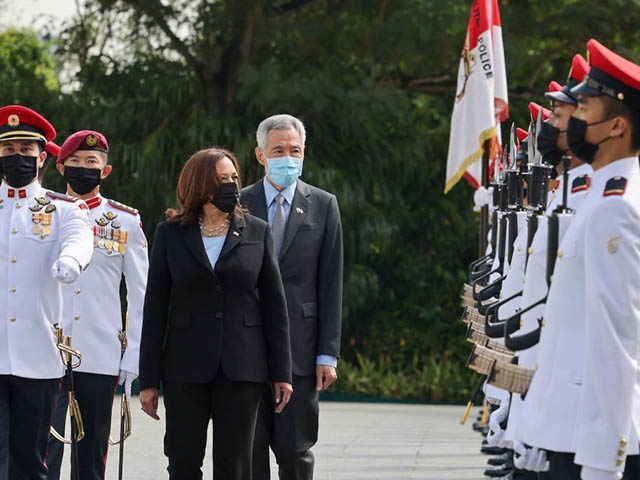China’s state-run Global Times on Monday had some fun at the expense of Vice President Kamala Harris, mocking her for flying to Singapore in an allegedly doomed effort to rally Asian powers against mighty China while her administration presides over a humiliating debacle in Afghanistan.
The Global Times laughed at Harris for being “unlucky” enough to draw the mission of convincing Singapore and Vietnam to “clash with China” while American prestige is crashing down in flames under President Joe Biden:
The US escape-style withdrawal from Afghanistan has severely impacted Washington’s international reputation. Her arrival in Southeast Asia provides a chance for local people to ask her face-to-face: Is the US still reliable? No matter where she goes, she will be viewed with suspicion. Bracing herself to shamelessly defend the argument that the US is still trustworthy will be her top priority during the trip.
Yet this is a mission impossible for Harris. Her visit to Vietnam will reinforce people’s memories of the hurry-scurry US withdrawal from Saigon in 1975 and the association that it is not the first time that the US military abandoned its allies and that the US is a habitual offender in this regard. Both Singapore and Vietnam are members of the Trans-Pacific Partnership, which was signed up to by the previous US Democratic administration. But the agreement was later abandoned by Washington.
The Global Times was confident that China’s maritime disputes with Vietnam would not cause the latter to reconsider its “balanced relationship” between China and the United States, especially now that Biden’s folly in Afghanistan has proven America is dangerously unreliable as an ally.

US soldiers stand guard behind barbed wire as Afghans sit on a roadside near the military part of the airport in Kabul on August 20, 2021, hoping to flee from the country after the Taliban’s military takeover of Afghanistan. (Photo by Wakil KOHSAR / AFP) (Photo by WAKIL KOHSAR/AFP via Getty Images)

Afghan citizens pack inside a U.S. Air Force C-17 Globemaster III, as they are transported from Hamid Karzai International Airport in Afghanistan, Sunday, Aug. 15, 2021. The Taliban on Sunday swept into Kabul, the Afghan capital, after capturing most of Afghanistan. (Capt. Chris Herbert/U.S. Air Force via AP)
This confident declaration was followed by a threat to show Vietnam just how little Washington can do to help them if Beijing decides to settle its territorial disputes by force:
China and countries including Vietnam have maritime territorial disputes. Those countries want to utilize the power of the US to increase their bargaining chips when facing China. To some extent, such a situation is hard to avoid. But they need to be very careful when doing so. If they go too far, they will fall into the US trap, bringing a strategic backlash upon themselves, especially when China is making great efforts to advocate South China Sea claimant countries to resolve their disputes through negotiation, when managing disputes have already become a regional consensus, and when constant progress has been made on the Code of Conduct in the South China Sea. It is believed they have got savvy on the matter.
The Global Times concluded by advising Harris to show a little “humility” and work to “rectify” America’s relationship with dominant China, instead of “saying stupid things” during her visit to Singapore.

This photo taken on January 4, 2021 shows Chinese People’s Liberation Army (PLA) soldiers assembling during military training at Pamir Mountains in Kashgar, northwestern China’s Xinjiang region. (Photo by STR / AFP) / China OUT (Photo by STR/AFP via Getty Images)
The Global Times alluded to Secretary of Defense Lloyd Austin’s trip to Singapore in late July, during which he also tried to firm up America’s ties with Vietnam using the most passive language possible, as summarized by the Military Times:
[Austin] repeated that Beijing’s claim to virtually the entire South China Sea “has no basis in international law” and “treads on the sovereignty of states in the region.”
He said the U.S. continues to support the region’s coastal states in upholding their rights under international law, and remains committed to the defense treaty obligations the U.S. has with Japan and the Philippines.
“Unfortunately, Beijing’s unwillingness to resolve disputes peacefully and respect the rule of law isn’t just occurring on the water,” Austin said. “We have also seen aggression against India … destabilizing military activity and other forms of coercion against the people of Taiwan … and genocide and crimes against humanity against Uyghur Muslims in Xinjiang.”
The Chinese Foreign Ministry responded by complaining that Austin “deliberately smeared China, interfered in China’s internal affairs,” and “sowed discords among regional countries” to advance U.S. geopolitical interests.
As Austin wrapped up his trip to Singapore, Voice of America News (VOA) noted that smaller Asian nations appear to have made their peace with China’s refusal to abide by international court rulings against its imperial claims over the South China Sea, and have largely decided to accept a little payoff from Beijing instead of fighting battles they cannot win:
China offered money to some maritime rivals after the arbitral verdict to keep the sovereignty issue at bay, analysts said at the time.
Neither the arbitral ruling nor anyone’s reaction to it will change China’s stance on its nine-dash line, so countries are raising the issue cautiously to stay on Beijing’s good side, said Shahriman Lockman, senior foreign policy and security studies analyst with the Institute of Strategic and International Studies in Malaysia.
“I think it’s a very calculated thing that they have to do,” Lockman said. “You say some things that are not pleasant to Chinese ears, but at the same time don’t push it too hard.”
If this analysis remains valid, Harris will likely receive a similar reception as Austin. Singapore, Vietnam, and other Asian nations do not wish to be seen embracing or validating China’s expansive territorial claims, but they are less interested in effectively resisting the rising Chinese empire than in signaling their unhappiness so Beijing will keep buying them gifts.

COMMENTS
Please let us know if you're having issues with commenting.